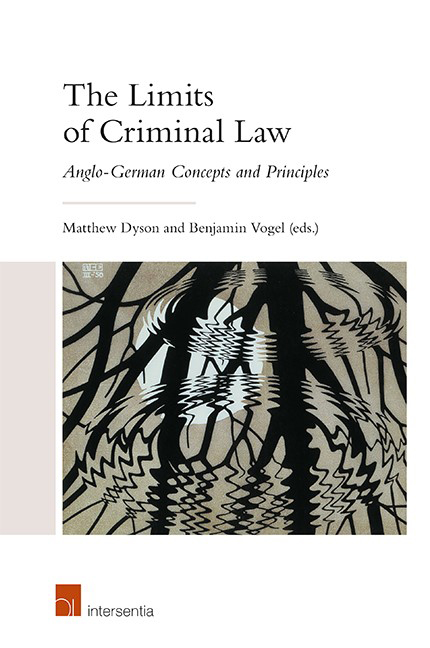Book contents
- Frontmatter
- Preface
- Contents
- List of Cases
- List of Abbreviations
- List of Contributors
- Chapter 1 Introduction
- PART I CORE PRINCIPLES OF CRIMINAL LAW
- PART II CRIME AND TORT
- PART III CRIME AND MEDICAL
- PART IV CRIME AND REGULATION
- PART V ADMINISTRATIVE SANCTIONS
- PART VI ALTERNATIVE ENFORCEMENT
- PART VII COUNTER-TERRORISM
- PART VIII CRIME AND INTELLIGENCE
- PART IX CONCLUSION
- Index
- About the Editors
Chapter 26 - Reflections on Criminal Law in England and Germany
Published online by Cambridge University Press: 11 February 2021
- Frontmatter
- Preface
- Contents
- List of Cases
- List of Abbreviations
- List of Contributors
- Chapter 1 Introduction
- PART I CORE PRINCIPLES OF CRIMINAL LAW
- PART II CRIME AND TORT
- PART III CRIME AND MEDICAL
- PART IV CRIME AND REGULATION
- PART V ADMINISTRATIVE SANCTIONS
- PART VI ALTERNATIVE ENFORCEMENT
- PART VII COUNTER-TERRORISM
- PART VIII CRIME AND INTELLIGENCE
- PART IX CONCLUSION
- Index
- About the Editors
Summary
RESULTS AND CAUTIONARY TALES
The volume began by asking what the limits of criminal law are. Having examined the core principles of the criminal law of England and Wales and of Germany, as well as seven areas where the criminal law meets and interacts with other areas of law, what then are its limits?
This concluding chapter will turn to reflect on what insights the volume offers about the criminal law generally, and in particular in both the English and German legal systems. It will do so with more explicit references to how the criminal law affects and is affected by the culture of legal actors and wider societal values in each legal system. After some brief preliminary observations on the meaning of criminal law enforcement, this conclusion will first focus on the higher-order features of criminal law itself. As the preceding chapters have shown, the criminal laws of the two jurisdictions differ in many ways, but they also share many similarities. While the law is a product partly of a country's legal culture and its history, the law in both jurisdictions, despite many important differences, aims at overall largely similar objectives and, in order to reach these objectives, has to overcome similar hurdles and accommodate similar concerns. Those similarities might be thought of as higher-order features of the criminal law, or of law more generally, and clarity about them allows us to contextualise the findings. In particular, it assists with finding and analysing functional equivalents, seeing whether they differ in substance or only in form, and, combined with good comparative law techniques, helps prevent projecting one system's reasoning or rules onto another’s, as well as the discrepancies of language and cultural predispositions of the individual observer. After having examined those general features, this chapter will then discuss those key features of the two domestic legal systems explored in this volume that, in view of the editors, have particular relevance for explaining the sometimes stark differences. Consequently, these concluding reflections do not focus on the details of how each law answers specific questions, but their aim is to contextualise the more detailed findings of the paired chapters and conclusions. It is hoped that the reader will finish the book with a wealth of material, and a sharpened sense of what criminal law is and what limits it.
- Type
- Chapter
- Information
- The Limits of Criminal LawAnglo-German Concepts and Principles, pp. 551 - 576Publisher: IntersentiaPrint publication year: 2020



